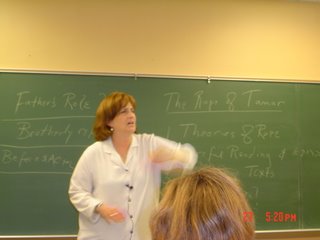 Yesterday, I attended the first day of the Yemei Iyun in Bible and Jewish Thought, run by YCT, in Teaneck, NJ. I went, just as I did last year, as student volunteer, helping people coming in register. Last year, there was a rotation of a few volunteers, so we would miss some classes to help at the registration desk each of the three days of the conference. This year, when I got there, I found out another student and I would be helping out with the main influx of people, and perhaps a little bit afterward, as there would be a staff member at the table the rest of the time. Although this would mean yesterday would be my only day at the conference (unless I wanted to pay for today and tomorrow), (not as I had planned) this would give me more time to finish up cleaning my room, etc.
Yesterday, I attended the first day of the Yemei Iyun in Bible and Jewish Thought, run by YCT, in Teaneck, NJ. I went, just as I did last year, as student volunteer, helping people coming in register. Last year, there was a rotation of a few volunteers, so we would miss some classes to help at the registration desk each of the three days of the conference. This year, when I got there, I found out another student and I would be helping out with the main influx of people, and perhaps a little bit afterward, as there would be a staff member at the table the rest of the time. Although this would mean yesterday would be my only day at the conference (unless I wanted to pay for today and tomorrow), (not as I had planned) this would give me more time to finish up cleaning my room, etc.Although I missed the first session to help at the desk, I ended up going to four other sessions. (If you are looking for links to recorded audio, there are none, though you can purchase cassette tapes of the presentations for $5 at the conference.) I went to Rabbi Hayyim Angel’s “Reward and Punishment in Tehillim”, Mrs. Rivy Poupko-Kletenik’s “The Rape of Tamar”, Rabbi Dr. Avraham Walfish’s “Structure and Meaning in Parshat Mishpatim”, and Rabbi Shalom Carmy’s “Joshua’s Two Farewell Speeches – Chapters 23-24”.
I had never met Rabbi Angel before, but I’ve found that he’s written quite a few articles on
 תנ"ך (including one in the same issue of the JBQ as my first published article), so it was a treat to sit in on that class.
תנ"ך (including one in the same issue of the JBQ as my first published article), so it was a treat to sit in on that class.I had last sat in on a class from Mrs. Poupko-Kletenik a few years ago when I attended CAJE 28 on women saying קדיש (kaddish). Her class was interesting, though the topic is so rich with material that it was a bit rushed. Nevertheless, it was certainly helpful in gaining an insight on how one might teach the topic (or similar topics, for that matter (most immediately, the Dinah story comes to mind)). One thing that was quite salient to me was that men and women view rape rather differently and that there are certainly gynocentric and androcentric perspectives to the topic.
Rabbi Walfish’s was interesting, as he showed similar lexical usages of terms after the עשרת דברים (lit., ten things or statements, but usually called the Ten Commandments) corresponding with the original set.
Rabbi Carmy’s presentation focused on showing the differences between the last two chapters in the book of Joshua, which was helpful in approaching what might otherwise seem a redundancy with them.
Also, I purchased a few books, myself, before leaving.
Okay, now back to cleaning, etc.
---------------------------
Tags: summer, summer 2006, YCT, Yeshivat Chovevei Torah, Tanakh, Tanakh Study, Yemei Iyun in Bible and Jewish Thought, YCT Yemei Iyun in Bible and Jewish Thought
1 comment:
bleah, wish i could've gone.
i had post-schoolyear teacher meetings all week.
Post a Comment